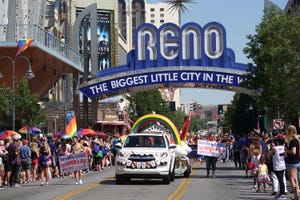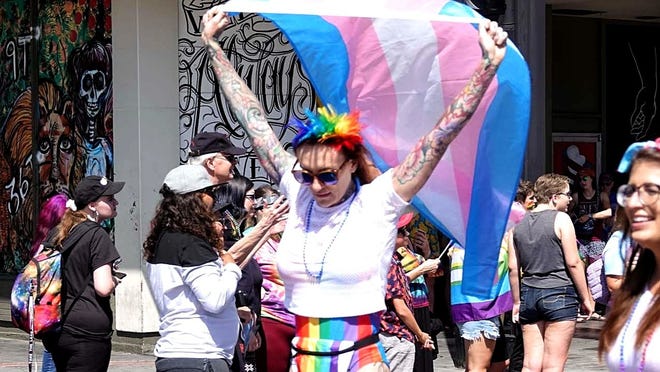
For many, Pride Month isn’t just a month. It’s what they live every day of the year.
“You could be the ‘A’ at the end of the alphabet, which stands for ‘ally,’” said Paco Lachoy, a longtime local journalist for the LGBTQ + community and founder of The Reno Gay Page.
“Pride is something that is with us every day, and we celebrate it every day,” he said. “It’s not just the month of June when the Stonewall Riots happened.”
Lachoy said he’s been involved in the LGBTQ+ movement even before the Stonewall Riots— a series of riots that erupted following a police raid of the Stonewall Inn, a gay bar in New York City, on June 28, 1969.
The incident is largely considered the catalyst that started the modern-day LGBTQ+ civil rights movement in the U.S.
“Because of that incident that set things off, it started gay liberation and freedom marches, which has now become Pride,” Lachoy said.
The LGBTQ+ movement has come a long way since then, particularly in Nevada, according to local transgender rights advocate Sherrie Scaffidi.
More:Northern Nevada Pride Festival set to return July 24
Scaffidi, a U.S. Navy Seabee veteran and transgender woman, has been lobbying for LGBTQ+ and women’s rights at the state legislature for the past several years.
She serves as the president of PFLAG Carson Region, a board member of Transgender Allies Group and is a Nevada veterans advocate. Last year, she also ran for the Nevada Assembly Seat in District 40.
“Between 2009 and 2019, we have passed 34 laws protecting the rights and safety of LGBTQ residents,” Scaffidi said.
According to the Human Rights Campaign, Nevada ranks as the best state in the country for LGBTQ people—mostly because of its nondiscriminatory laws and low rate of hate crimes motivated by gender identity or sexual orientation.
Here’s a look back at Reno’s Pride history, the groundbreaking Reno Gay Rodeo and how rights have improved for the LGTBQ+ community in Nevada.
Reno’s ‘strong gay history’
Lachoy has been sharing stories on the LGBTQ+ community for nearly three decades in the region’s first and only gay newspaper, now an online-only website.
“Reno has a really strong gay history,” Lachoy said. “A lot of people don’t know that because it’s been, as you would say, in the closet for a long time and it’s just now coming out.”
The first Pride event was held in 1987 at Rock Park in Sparks, according to Lachoy.
“It was kind of private, and it was kind of quiet,” Lachoy said. “They had a little Pride Parade around a bar using decorated shopping carts back in the 80s. The community has become more out, sort of speak.”
‘Love always trumps hate’:Tire marks cleaned from Reno Arch rainbow crosswalk
The event eventually evolved into what Lachoy calls “the modern-day Pride,” which was first celebrated in 1997. Then, the first parade was held in 1999, he said.
“In Reno, we used to celebrate in August,” Lachoy said. “In fact, for a little bit, we had two pride celebrations three weeks apart, which really confused people.
“One has gone away because the person who put it on has passed,” he said. “It was around for almost 40 years. The Northern Nevada Pride has been around for eight years.”
Lachoy, who was on the planning committee for the first few Pride festivals, said Northern Nevada Pride has become a part of Artown. It’s one of the reasons Reno celebrates Pride Month in July.
“Reno is very conservative,” he said. “We had several people dressed in what we felt was inappropriate for Reno, and they were asked to go home and change.
“It has changed where you could probably get away with that now,” Lachoy said. “In the last 10 years, things have greatly changed in a positive way.
Gay rodeo has roots in Reno
On Oct. 2, 1976, the first Reno Gay Rodeo was held at the Washoe County Fairgrounds in Reno, according to OutHistory.org, a site that tracks historical moments within the LGBTQ+ community.
The Reno Gay Rodeo started with the Silver Dollar Court, the oldest LGBTQ organization in Nevada.
“It wasn’t real big then, but by 1980, it grew to draw over 40,000 people,” Lachoy said. “There were all kinds of protests.”
He said some people opposed to having a gay rodeo tried complaining to Washoe County commissioners to have them stop the event.
“The protesters were protesting, and AIDS was becoming a big thing,” he said. “It was very successful for eight years. Then they had a very bad year. AIDS was really taking over.”
The AIDS epidemic sparked fear among the public, and the Reno Gay Rodeo faced a stronger threat of violence than in past years, according to a 2019 report from KUNR Public Radio.
Although the Reno Gay Rodeo died out, it was the inspiration for the National Gay Rodeo Association. Gay rodeos still take place in other parts of the country, including Las Vegas.
“They still recognize Reno as the birthplace of gay rodeo,” Lachoy said, adding he believes the community has become more accepting of the LGBTQ+ community.
“The city is so diverse, and I don’t think a lot of people know that,” he said. “Reno has kind of a red-neck personality, or that’s how it’s perceived, and it definitely isn’t that. If anything, it’s eclectic.”
Protecting the LGBTQ+ community
Both Lachoy and Scaffidi agreed Nevada has been progressive when it comes to laws protecting the LGBTQ+ community.
“Nevada is one of those states that has so many rights that protect gay and lesbian people because we’ve gone to the legislature,” Lachoy said. “They’ve learned that gay and lesbian people aren’t a threat to them. We’re just like everybody else.”

In 1999, Sen. David Parks became the first openly LGBTQ person elected to the Nevada State Legislature. He blazed the trail for pro-LGBTQ legislation.
Parks was instrumental in securing marriage equality in the Silver State in 2015—even before the Supreme Court’s historic ruling in favor of nationwide marriage equality.
Nevada also has several other nondiscriminatory laws that protect the LGBTQ+ community, from parenting laws to statutes against hate crime and protections for healthcare access.
“Between 2009 and 2019, we passed 34 laws protecting the rights and safety of LGBTQ residents,” Scaffidi said. “This year, we passed four laws that are positive for the LGBTQ community.”
Those laws include:
- Assembly Bill 261: AB 261 requires schools to educate students on the contributions made within the sciences, arts and humanities by multiple minority groups, including those from the LGBTQ+ community.
- Senate Bill 109: SB 109 revised provisions relating to the collection of certain information related to sexual orientation and gender identity by governmental agencies.
- Senate Bill 237: SB 237 allowed for LGBTQ-owned businesses to be designated as minority-owned businesses, which means business owners can apply for grants or public contracts.
- Senate Bill 275:SB 275 decriminalizes the transmission of HIV. Previous laws meant anyone who knowingly or willfully engaged in a manner that could transmit HIV could be charged with a felony.
Lachoy said that, politically, the fight to protect the LGBTQ+ community started with preventing the Nevada Citizens Alliance from banning homosexuals from teaching or holding any kind of public position.
Then in 1999, the state also passed workplace protection laws.
“They couldn’t discriminate anymore based on your sexual orientation,” Lachoy said.
Jeromy Manke, president of Our Center and director for Northern Nevada Pride, described the passing of marriage equality at the federal level in 2015 as a “huge moment” for the LGBTQ+ community.
More:LGBTQ community praises Nevada as first state to protect same-sex marriage
Despite the national change, Nevada still had a state constitutional amendment limiting marriage between a man and woman.
“Although a Supreme Court ruling in 2015 had invalidated that, it was still something that was on the books that we worked for a long time and finally got removed,” Manke said. “It was just revoked in 2020.”
Manke said that, although it had no legal bearing, it still “enshrined” discrimination in the state constitution.
Lachoy said Pride Month has been the foundation for all of the progress that has been made throughout the years.
“We’re families; we’re parents; we’re grandparents; we’re teachers; we’re doctors; we’re lawyers,” Lachoy said. “We’re newspaper people, and we’re on TV. We’re everywhere, and you may never ever know.”
Marcella Corona is a reporter covering local underrepresented communities in Northern Nevada. Support her work by subscribing to RGJ.com.









